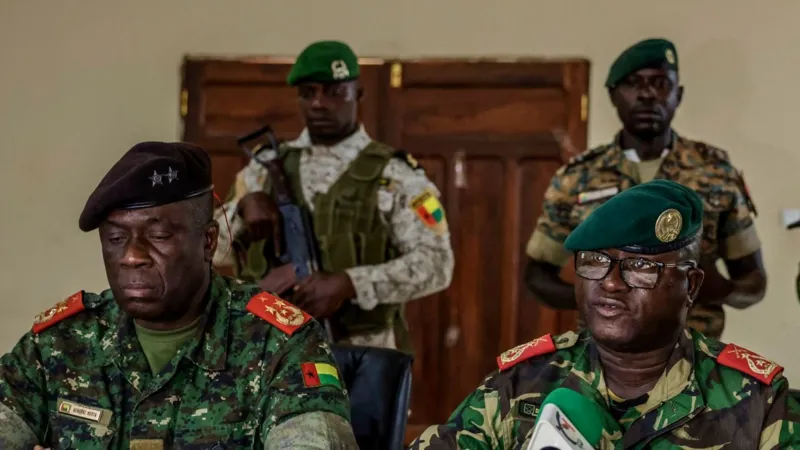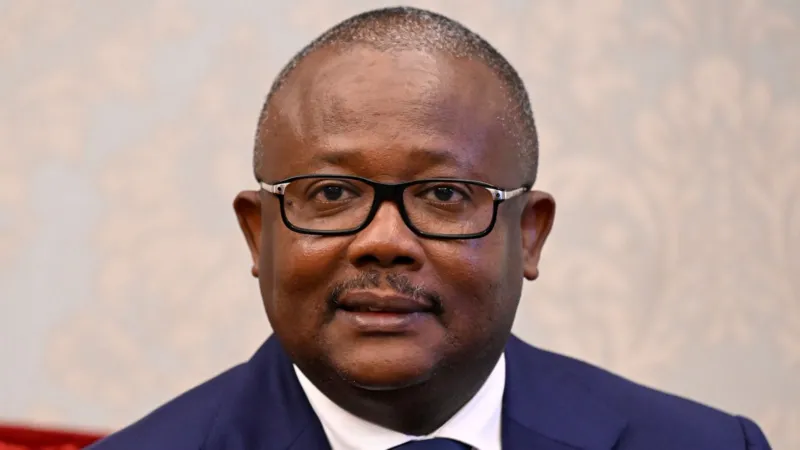Heavy gunfire erupted near Guinea‑Bissau’s presidential palace on Wednesday as soldiers in uniform seized control of the main road leading to the building.
Hours later, the armed forces announced they had taken “total control” of the country, suspended elections and closed its borders.
General Denis N’Canha, head of the presidential military office, declared that a command “composed of all branches of the armed forces” was assuming leadership of the nation “until further notice.”
He read the announcement seated at a table, surrounded by armed soldiers.
N’Canha claimed the military had uncovered a destabilization plot involving “national drug lords” and the smuggling of weapons to undermine constitutional order.
He announced the suspension of the electoral process, a nationwide curfew, and the closure of land, air, and sea borders.

By evening, the streets of Bissau were deserted, with soldiers controlling all major thoroughfares.
President Umaro Sissoco Embalo, who had been favored to win re‑election in last Sunday’s polls, was arrested and taken to general‑staff headquarters, where military sources said he was being “well‑treated.”
He was detained alongside the chief of staff and the interior minister.
Opposition leader Domingos Simões Pereira, barred from contesting the election by a Supreme Court ruling, was also arrested, according to sources close to him.
Pereira had thrown his support behind opposition candidate Fernando Dias, who, like Embalo, had already declared victory ahead of official results expected Thursday.
International Reactions
The United Nations Secretary‑General António Guterres said he was following the situation with “deep concern” and urged restraint and respect for the rule of law.
Portugal, Guinea‑Bissau’s former colonial ruler, called for the resumption of the electoral process and discouraged “any act of institutional or civic violence.”
Election observation missions from the African Union (AU), ECOWAS, and the West African Elders Forum condemned the military takeover as “a blatant attempt to disrupt the democratic process.”
In a joint statement signed by AU mission head Filipe Nyusi, ECOWAS mission head Issifu Kamara, and former Nigerian president Goodluck Jonathan, the missions demanded the immediate release of detained electoral officials to allow the vote to conclude.
Repeat Crises
Guinea‑Bissau has experienced four coups and multiple attempted coups since independence in 1974.
The country is among the world’s poorest and has long been a hub for drug trafficking between Latin America and Europe, a trade facilitated by chronic instability.
The last presidential election in 2019 was marked by a four‑month crisis as both Embalo and Pereira claimed victory.
This year’s vote excluded Pereira and his PAIGC party after the Supreme Court ruled their applications were filed too late, a decision the opposition denounced as manipulation.
Embalo dissolved the legislature in 2023 and has since ruled by decree, further heightening tensions.
The coup adds to a wave of military takeovers across West Africa, including Mali, Burkina Faso, Niger, and Guinea.
ECOWAS had deployed more than 6,780 security personnel to Guinea‑Bissau for the vote, but the intervention failed to prevent Wednesday’s upheaval.
With both the president and a leading opposition figure under arrest, Guinea‑Bissau faces yet another uncertain chapter in its turbulent history.
Regional bodies have called for calm and the restoration of constitutional order, but the military’s grip on power only means the possibility of prolonged instability.
Rate, Like 👍, Comment 💬, Share this article, Follow us on our social media handles, and Submit your own story to get featured and earn rewards!







